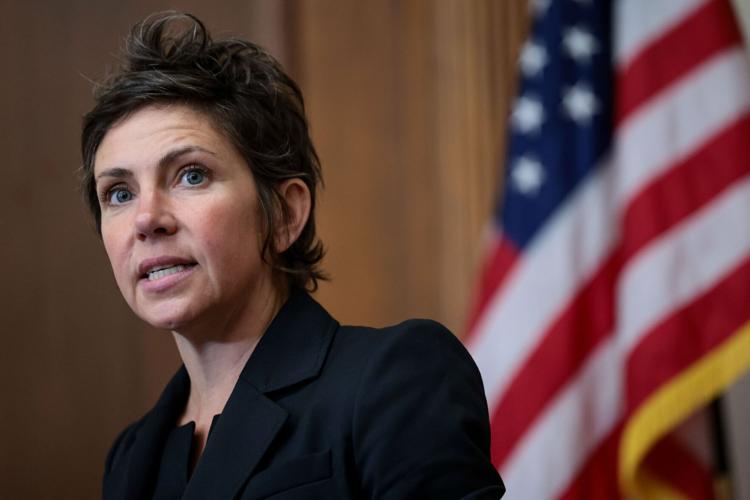ST. LOUIS — Four Black aldermen are criticizing Mayor Cara Spencer’s decision to halt parts of the city’s minority contracting program over concerns about federal threats to it, saying she made the wrong call and didn’t talk to them before she did it.

Mayor Cara Spencer speaks during a press conference marking her first 100 days in office at City Hall in St. Louis, on Thursday, July 24, 2025.
In a letter led by Alderwoman Pam Boyd, of Walnut Park West, the aldermen said the program, which sets participation goals for minority- and women-owned businesses on city construction contracts and private projects receiving city subsidies, is legal and should be reinstated.
And they said her failure to consult them before acting raised questions about her ability to lead a diverse city in the wake of a tornado that did much of its damage in heavily Black north St. Louis.
“This decision is a prime example of where leadership had an opportunity to shine and prove that St. Louis does have a path forward for ALL,” the letter reads. “Sadly, the chosen path to deliberately exclude others in the solution making process says that we can expect more of the same history that has plagued St. Louis, exclusion.”
People are also reading…
“We can only pray that is not the case,” the aldermen continued, “but at this point, the facts indicate that this will be a long four-year experience.”
The letter — signed by Boyd and aldermen Alisha Sonnier, Laura Keys and Rasheen Aldridge — marks some of the harshest official criticism yet of Spencer, in just her fifth month in office. And it could mean trouble this fall as the administration prepares to propose to aldermen a replacement for the minority contracting policy, one that is “adaptive” to Trump administration directives urging race-neutral criteria.
Aldermanic President Megan Green has also opposed Spencer’s decisions, noting the city has commissioned studies to make sure the program passes legal muster and that the program’s goals are not mandates.
“It sets aspirational goals based on market availability and documented disparity, which courts have historically viewed as legally permissible when supported by strong evidence as detailed in our disparity study,” she wrote in an email to the mayor’s office Monday.
Bidders on projects can come in under targets as long as they show they made “good-faith efforts” to contract with minority- and women-owned businesses.

Spencer
At a news conference Tuesday, Spencer called the letter from the aldermen “unfortunate.” Staff, she said, have been communicating with aldermen. And the city, she said, has few choices right now: Federal officials have made clear threats to federal funding to cities operating diversity initiatives, and the city has a lot to lose right now, from disaster recovery money to help rebuild after the tornado to transportation grants needed to renovate St. Louis Lambert International Airport.
“Sometimes people take out their feelings in ways that you can’t predict,” Spencer said, “but we’re going to continue to move forward here.”
The push for policy steering parts of government contracts toward Black businesses and workers dates back to the civil rights era in St. Louis. In 1964, activist Percy Green climbed the partly completed Gateway Arch to . Mayor Vincent Schoemehl Jr., now an adviser of Spencer’s, established some of the first benchmarks for new construction projects in the early 1990s: 25% for Black and Hispanic subcontractors and 5% for companies owned by women. From 2016 to 2021, minority- and women-owned firms received roughly a third of $1.8 billion in city construction contracts, according to a study commissioned by the city.
The Trump administration, however, has recently told federal agencies, colleges and city halls across the country to dismantle their diversity programs.
The Justice Department has threatened to claw back federal grants that cities like St. Louis rely upon to balance their budgets if they don’t toe the line.
Spencer said in her letter that the city would on Monday halt the issuance of most new construction contracts and subsidies for projects subject to the hiring goals. And the city’s development arm has hired a consultant to help rewrite the program.
But Boyd, the alderwoman, said in an interview Tuesday that things are moving too fast.
She said she shares Spencer’s concerns about losing federal funding.
“But until we all come to the table, we shouldn’t do anything,” she said. “We need to stop and have conversations. And we haven’t had conversations.”
Mayor Cara Spencer reiterates in a press conference that the approval of a disaster declaration for the city of St. Louis is just a first step and that recovery will take time. Video courtesy of the city of St. Louis. Edited by Jenna Jones











